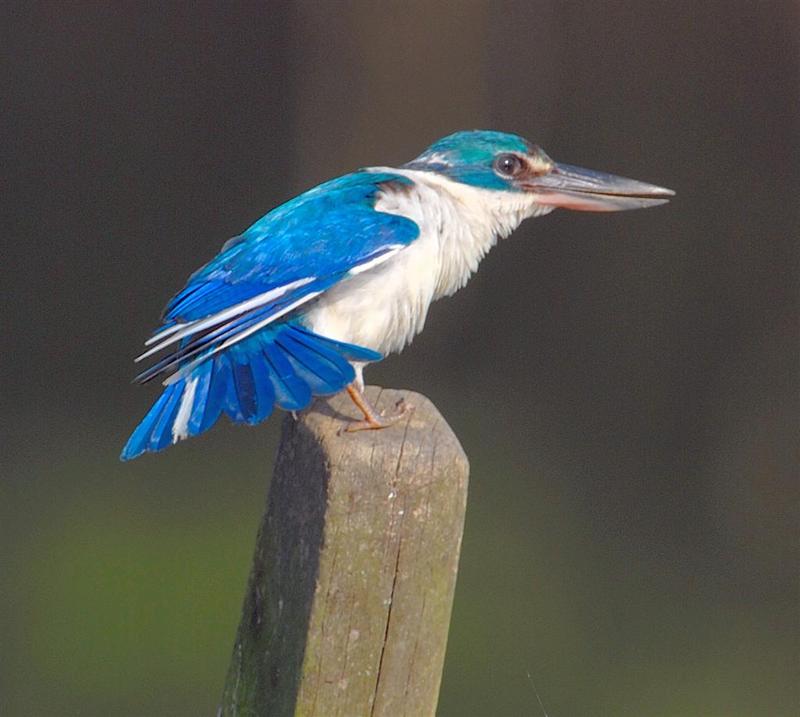Collared Kingfisher
From Wikipedia, the free encyclopedia
[Photo] Collared Kingfisher (Todirhamphus chloris), Singapore. Author Flickr user NatureAtYourBackyard http://www.flickr.com/photos/64684201@N00/
The Collared Kingfisher (Todiramphus chloris) is a medium-sized kingfisher belonging to the family Halcyonidae, the tree kingfishers. It is also known as the White-collared Kingfisher . It has a wide range extending from the Red Sea across southern Asia and Australasia to Polynesia. It is a very variable species with about 50 different subspecies.
Description
The Collared Kingfisher is 22 to 29 cm long and weighs 51 to 90 grams. It varies from blue to green above while the underparts can be white or buff. There is a white collar around the neck, giving the birds its name. Some races have a white or buff stripe over the eye while others have a white spot between the eye and bill. There may be a black stripe through the eye. The large bill is black with a pale yellow base to the lower mandible.
Females tend to be greener than the males. Immature birds are duller than the adults with dark scaly markings on the neck and breast.
It has a variety of calls which vary geographically. The most typical call is loud, harsh and metallic and is repeated several times.
Habitat and range
It is most commonly found in coastal areas, particularly in mangrove swamps. It also inhabits farmland, open woodland, grassland and gardens. In some parts of its range, especially on islands, it can be seen further inland, ranging into forest or into mountain areas. Birds often perch conspicuously on wires, rocks or bare branches.
The most westerly subspecies is T. c. abyssinica of north-east Africa which is found in patches of mangroves in Eritrea and has also been recorded from Sudan and Somalia. Further east in Arabia is the endangered race T. c. kalbaensis with a population of 55 pairs or less; these are almost entirely restricted to Khor Kalba in the United Arab Emirates but breeding has also occurred recently at Khor Shinass in Oman. Further subspecies occur locally around the coasts of India and Bangladesh and on the Andaman and Nicobar Islands. In Southeast Asia and Indonesia the species is widespread and common, occurring far inland in some regions. It once more becomes a mainly coastal species in New Guinea and in northern Australia where it occurs from Shark Bay, Western Australia around to north-east New South Wales. On the Pacific islands it is usually common in a variety of coastal and inland habitats with various subspecies present on the Bismarck Archipelago, Solomon Islands, Vanuatu, Fiji, Tonga, American Samoa, Palau and the Northern Marianas.
Feeding
Small crabs are the favoured food in coastal regions but a wide variety of other animals are eaten including insects, worms, snails, shrimps, frogs, lizards and small fish. The bird perches almost motionless for long periods waiting for prey. When it spots something it dives down to catch it and then flies back to the perch where larger items are smashed against the branch to subdue them. Any indigestible remains are regurgitated as pellets.
Reproduction
The nest is a hole, either a natural tree hole or a burrow excavated by the birds themselves in a rotten tree, termite mound or earth bank. They will also occupy old woodpecker holes. Two to seven rounded whitish eggs are laid directly on the floor of the burrow with no nest material used. Both parents take part in incubating the eggs and feeding the chicks. The young birds leave the nest about 44 days after hatching. Two broods are often raised in a year.
http://en.wikipedia.org/wiki/Collared_Kingfisher
| The text in this page is based on the copyrighted Wikipedia article shown in above URL. It is used under the GNU Free Documentation License. You may redistribute it, verbatim or modified, providing that you comply with the terms of the GFDL. |
|

